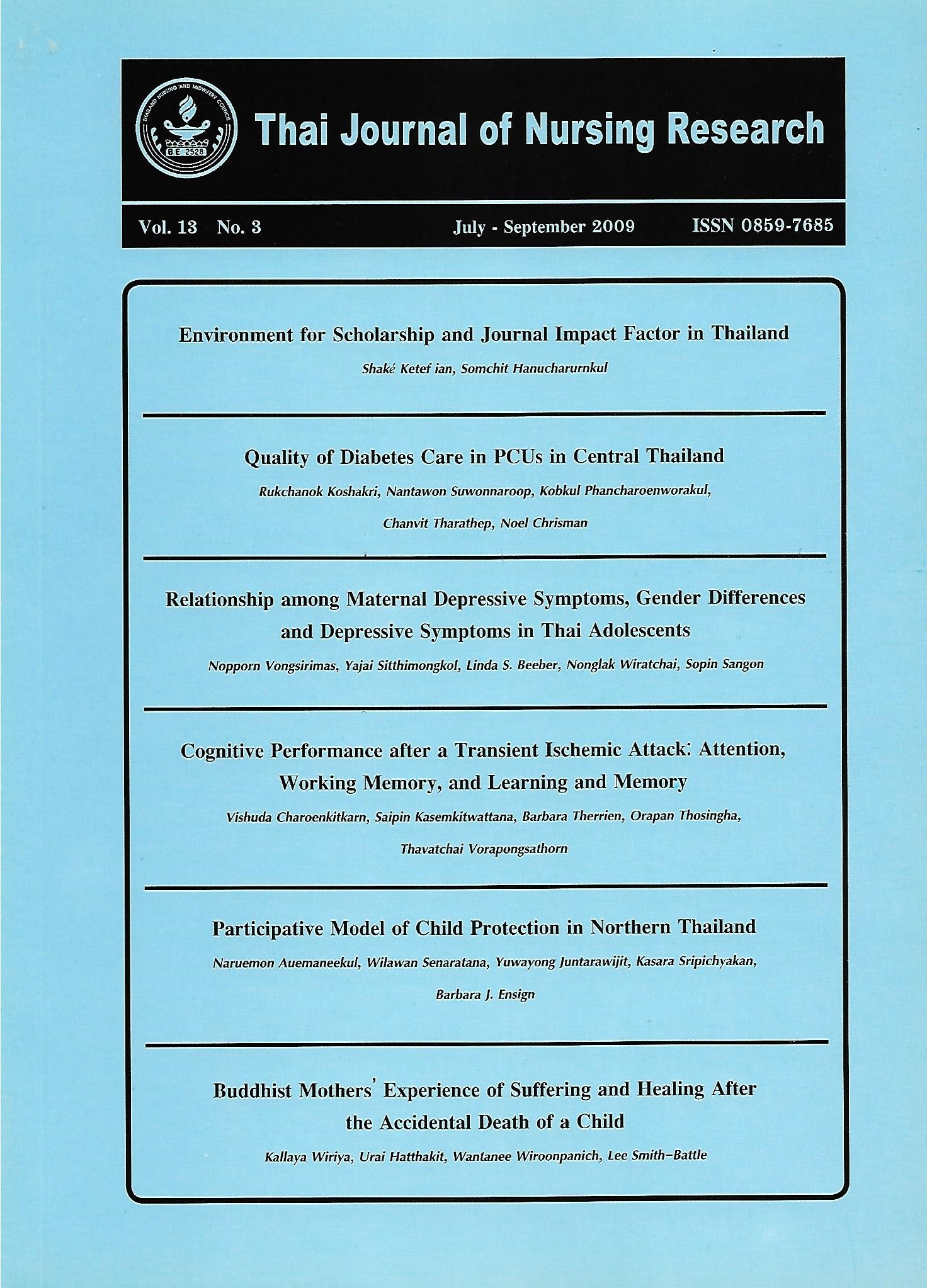Environment for Scholarship and Journal Impact Factor in Thailand
Keywords:
อิมแพคแฟคเตอร์, ศาสตร์ทางการพยาบาล, การตีพิมพ์, สิ่งแวดล้อมเชิงวิชาการ, ประเทศไทย, Impact factor uses, Nursing science, Publications, Scholarship, ThailandAbstract
บทคัดย่อ
มีจำนวนสถาบันเพิ่มขึ้นหลายแห่งในประเทศต่างๆ ที่ต้องการให้นักวิชาการตีพิมพ์ผลงานในวารสารที่มีอิมแพคแฟคเตอร์ (Impack facter) สูง โดยการสร้างระบบการให้รางวัลและแรงจูงใจต่างๆ มีบทความต่างๆ ที่ได้กล่าวถึงความเหมาะสมและไม่เหมาะสมของการใช้นโยบายเหล่านี้ ดังนั้นรายงานการศึกษานี้เป็นการศึกษาในประเทศไทย ชึ่งเป็นส่วนหนึ่งในการศึกษาจาก 5 ประเทศ มีวัตถุประสงค์ เพื่อสำรวจ 1) สถาบันต้องการให้อาจารย์ตีพิมพ์ผลงานในวารสารที่มีอิมแพคแฟคเตอร์ สูงมากน้อยเพียงใด 2) จากแรงกดดันให้ตีพิมพ์ผลงานในวารสารที่มีอิมแพคแฟคเตอร์สูง มีผลให้นักวิชาการพยาบาลเลือกเรื่องที่จะทำวิจัย และการพัฒนาองค์ความรู้ของศาสตร์ทางการพยาบาลอย่างไร วิธีการศึกษาใช้วิธีการวิจัยเชิงคุณภาพ ใช้แบบ สอบถามเก็บข้อมูลเกี่ยวกับความคิดเห็นของอาจารย์พยาบาลที่เป็นผู้อาวุโสทางวิชาการและสอนในระดับปริญญาเอกสาขาพยาบาลศาสตร์จาก 7 สถาบันๆ ละ 1 คน มีอาจารย์ยินดีให้ข้อมูล จำนวน 5 คน วิเคราะห์ข้อมูลโดยการวิเคราะห์เนื้อหาสรุป และเสนอเชิงพรรณาความ
ผลการวิจัยพบว่า ผู้ให้ข้อมูลทั้งหมดบอกว่า มหาวิทยาลัยคาดหวังให้อาจารย์ตีพิมพ์ในวารสารที่มีอิมแพคแฟคเตอร์สูง ด้วยเหตุนี้ทำให้เกิดการแข่งขันแทนที่จะร่วมมือกัน อาจารย์ที่ตีพิมพ์ในวารสารต่างประเทศที่มีอิมแพคแฟคเตอร์สูง ถือว่าเป็นผู้มีส่วนทำให้มหาวิทยาลัยมีชื่อเสียง แต่ปัญหาการวิจัยอาจไม่สอดคล้องกับปัญหาสุขภาพของประเทศอย่างแท้จริง อาจารย์ที่ให้ข้อมูลเหล่านี้กล่าวถึงความยากลำบากและประโยชน์ของนโยบายนี้คือ อาจารย์จะต้องศึกษาปัญหาสุขภาพของประเทศ แต่จะต้องวางกรอบการนำผลการวิจัยไปใช้ที่ทำให้ผู้อ่านทั้งในและต่างประเทศสนใจ ผู้วิจัยได้อภิปรายและแปลผลตามข้อเท็จจริงของประเทศไทย
คำสำคัญ: อิมแพคแฟคเตอร์ ศาสตร์ทางการพยาบาล การตีพิมพ์ สิ่งแวดล้อมเชิงวิชาการ ประเทศไทย
Abstract
An increasing number of institutions, internationally, are requiring their faculties publish in journals with high impact factors (IF), and providing various types of rewards to motivate scholars to do so. The literature describes appropriate and inappropriate uses of such policies. Thus, this study, as part of a five country study, aimed to explore, in Thailand: (a) the extent to which institutions are requiring faculty to publish in high impact journals, and (b) how the pressure of publishing in high impact journals influences a nurse scientist’s choice of topic for investigation, and the development of nursing science. The design was qualitative, using a questionnaire designed to obtain respondent views. One senior faculty member, from each of the seven nursing doctoral programs in the country, was invited to participate; five did so. Objective responses were summarized and descriptively presented. Content analysis was used for narrative responses.
Results indicate that faculties were expected to publish in high IF journals. The faculties stated this led to: competition instead of cooperation; and, authors wanting to publish in journals of other countries, so as to bring prestige to their institutions. However, they felt this does not contribute to resolving health problems of the country, and further enumerated the hurdles and positive outcomes of the policy. They said Thai scholars study health problems of the country, and frame the practical applications of their work, in terms that might be of interest to their country, as well as to other countries. Results were discussed and interpreted in view of current realities in Thailand.
Keywords: Impact factor uses; Nursing science; Publications; Scholarship, Thailand
Downloads
How to Cite
Issue
Section
License
Copyright: The Pacific Rim International Journal of Nursing Research, Thailand Nursing & Midwifery Council has exclusive rights to publish, reproduce and distribute the manuscript and all contents therein.







.png)


